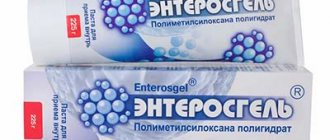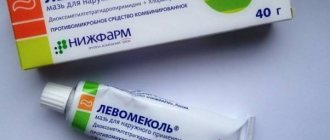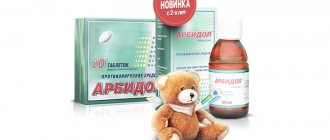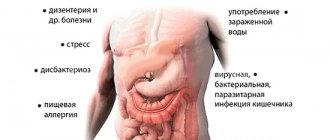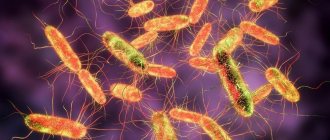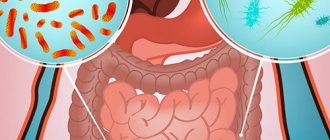Intestinal infections belong to a group of infectious diseases that cause damage to the digestive tract and lead to the development of toxic reactions and dehydration of the body. These diseases are especially common in children - their susceptibility is approximately two to three times higher than in adults. In pediatrics, intestinal infections occupy second place in the structure of infectious morbidity after ARVI. Approximately half of the cases of disease in children occur at an early age, up to three years.
The peak incidence of intestinal infections is observed in the summer and autumn, but there are often cases when a disease (for example, rotavirus infection) affects a child in winter. After recovery, the child develops type-specific unstable immunity, that is, he can suffer from intestinal infections many times.
How is intestinal infection transmitted?
Infection occurs when a pathogenic virus or bacteria enters the child’s body, namely, into the gastrointestinal tract. Most often, infection occurs in the following ways:
- when communicating with an infected person, the disease is transmitted by airborne droplets and through dishes, dirty hands, toys and household items;
- through low-quality food products;
- through contaminated water containing pathogens.
There are cases where children with weakened immune systems were infected with opportunistic bacteria living inside the body, without any external influence. But still, most often, morbidity is caused by non-compliance with the rules of personal hygiene and unsatisfactory sanitary and hygienic conditions at home, in kindergarten and school.
Incubation period
A child who has had a viral infection remains a carrier of the virus and a source of infection for others for two to four weeks after recovery. And with bacterial infections, the child is a source of infection only for a few days after the disease has subsided.
https://youtu.be/Qt7TUuADHmo
When do you get rotavirus infection?
Rotavirus is resistant to many antiseptics and loves the cold very much, incl. and refrigerator conditions. That is why the disease is observed in the winter season. The infection spreads through sick people, and because... The virus is highly contagious and often causes outbreaks in organized groups, such as kindergartens, schools, and dormitories. Intrafamily transmission of the virus is common. The period from the moment of penetration of rotavirus until the appearance of the first symptoms ranges from 15 hours to 5-7 days.
Symptoms of intestinal infection in children
Some symptoms of gastrointestinal infections are very similar to ARVI. In many children, the onset of infection occurs as a cold. There is an increase in temperature, signs of rhinitis, cough, sore throat. A few days later, signs of acute intestinal disorder are added to the symptoms of flu.
| Symptom of the disease | Characteristics of the symptom |
| General intoxication | Newborn babies become lethargic, their activity decreases, they refuse to eat, and they cry for no reason. Older children experience similar symptoms and may also complain of headaches and dizziness. |
| Temperature increase | The child’s body temperature rises to 38-39°C in the first few days of the disease. Then the temperature decreases slightly, but the same clinical picture remains. In severe cases, the child has a high fever for up to a week or more. |
| Diarrhea | In children under two years of age, bowel movements due to intestinal infection can occur more than 10 times a day. In this case, the stool is watery, interspersed with mucus and foam. Loose stools can bother a child for up to two weeks, causing dehydration. This can cause intoxication and complications of the disease. |
| Vomit | Frequent vomiting in a child is observed in the first day. Children under one year of age may vomit for longer, up to 48 hours. |
| Abdominal pain | The child complains of abdominal pain. When palpating the middle and lower abdomen, the pain intensifies. |
Children of preschool age in most cases suffer more severely from the disease than older children. Infection in children leads to severe intoxication of the child’s body, and severe intestinal disorders complicate the picture. With diarrhea, watery stools may become greenish or foamy and contain blood particles and mucus. The child may complain of bloating and severe abdominal discomfort. Usually these are cramping attacks of pain, which may be accompanied by a false urge to defecate. Seething, rumbling, and gases may also be observed, while the baby vomits and complains of severe nausea. Worries include chills and fever, weakness, and in severe cases, confusion.
How to treat rotavirus
Children aged 1 to 3 years are most susceptible to rotavirus. How many days the disease is treated depends on many factors:
- age,
- conditions of infection,
- detection time,
- immunity status, etc.
The average duration of the disease is up to 7 days . At an older age, the child’s body produces antibodies that significantly shorten the duration of the disease and facilitate its course.
Specific therapy, as a rule, is not used, but the main manifestations of the disease will have to be eliminated.
Fighting dehydration
One of the main problems with rotavirus is dehydration . A large amount of fluid and nutrients is lost or does not enter the body during diarrhea, vomiting, increased sweating, high fever, and refusal to eat.
Prognosis and risks for children
The main danger of acute viral infections in children is rapid dehydration and disruption of water-salt balance, especially when it comes to babies under one year old. Signs that your baby has lost too much fluid:
- strong thirst;
- scanty or absent urine;
- sunken eyes, dry eyes (lack of tears);
- dry mucous membranes in the mouth;
- rapid breathing;
- cold arms and legs, “marbled” skin;
- a sharp drop in body weight.
In this condition, the child requires immediate medical attention.
Consequences
Severe forms of intestinal infections in children, their untimely and improper treatment can lead to complications such as pulmonary edema, acute renal failure, acute heart failure, hypovolemic shock (a pathological condition caused by a rapid decrease in circulating blood volume), DIC syndrome (impaired blood to clotting) and infectious-toxic shock.
How to treat intestinal flu
A universal cure for rotavirus has not been developed. Drugs used in complex therapy for the diagnosis of “intestinal infection”:
- means for stabilizing water and electrolyte balance - prevent dehydration;
- enterosorbents;
- antipyretic and enzyme medications;
- antiemetics.
Baked apples
- baked apples with honey;
- crackers;
- cereal porridge with water;
- vegetable and fruit purees;
- bouillon.
If symptoms worsen and general condition worsens, meat products, soups and freshly squeezed juices are excluded from the diet. During the period of illness, there is no appetite: a person practically does not eat - the diet is based on a meager and monotonous menu. The foods included in the diet are necessary to maintain metabolism and water-salt balance in the body.
Drugs for the treatment of rotavirus infections in adults include agents for rehydrating the body. As the pathology progresses, the person suffers from severe dehydration. It is necessary to prevent further fluid loss through vomiting and loose stools. To restore water balance, medications are used:
- Regidron;
- Enterodesis;
- Citroglucosolan.
Intravenous and oral administration of medications is possible. Rarely, taking a small amount of liquid provokes a new attack of vomiting. As a result, the dehydration process can continue for more than 24 hours. To prevent the development of complications, the patient is hospitalized and given IV drips in a hospital setting. To replenish fluid, infusion of saline and 5% glucose solution is used.
Antiviral drugs for intestinal infections
Treatment of diseases caused by viruses requires an integrated approach: • rehydration (replenishment of lost fluid); • symptomatic (enterosorbents) therapy; • etiotropic (antiviral) therapy aimed directly at eliminating the cause of the disease; • first of all, it is necessary to select an antiviral drug that will immediately begin to fight the disease.
However, it must be remembered that in a patient with a viral intestinal infection, vomiting is a typical symptom, so tablet drugs may not always be suitable, as they may increase the urge to vomit. In addition, a child who does not feel well may simply refuse to take the pills. Moreover, the simultaneous use of tablets with enterosorbents, if the waiting time for their action is violated, can lead to the fact that not the entire dosage of the drug enters the body. Enterosorbents can “absorb” part of the tableted drug.
That is why many people use suppositories (suppositories) to treat viral intestinal infections. The suppository can be inserted quickly, easily and without any discomfort for the child. If there is vomiting, problems with the drug entering the body cannot arise. The speed of action of suppositories is also determined by the method of their administration. The rectum has a dense network of blood vessels, through which the drug is quickly absorbed into the blood and immediately begins to act.
One of the antiviral drugs, which is available in the form of suppositories, is the drug VIFERON. It suppresses the activity of viruses and increases the effectiveness of the body's own immune response to pathogenic microorganisms.
Reception scheme
VIFERON is used for the treatment of enteroviral and adenoviral infections according to the following regimen: 1 suppository 2 times a day for 5 days, the dosage is selected depending on the age of the patient (150,000 IU and 500,000 IU) according to the instructions.
The drug VIFERON Suppositories acts carefully - it is allowed for children from the first days of life. The regimen of using the drug (2 times a day) is comfortable for both children and their parents.
Treatment of viral infections using other groups of drugs
To alleviate the condition of intestinal viral diseases, intestinal sorbents and dehydration drugs are taken. "Smecta" in children removes viruses and their toxins from the intestines and promotes recovery. In adults, drugs such as Enterosgel and activated carbon.
If a secondary infection occurs, he recommends taking Levomycetin, doing a bacteriological culture and determining which drugs the pathogenic microflora of the gastrointestinal tract is sensitive to. Children with a tendency to intestinal pathology are given suppositories with chlorhexidine called Hexicon.
It is recommended to take "Regidron" for adults and children. Antiemetics are prescribed for symptomatic purposes against vomiting. For nausea you can use Motilium or Cerucal. In case of intense vomiting in a child, they are administered parenterally. Treatment with folk remedies for rotavirus will not help. If the child has a fever, give the child an antipyretic. If diarrhea occurs, use inexpensive drugs - Loperamide or Imodium.
Before deciding which medications to take, consult with specialists. They will help determine whether certain medications are needed to treat rotavirus infection and how many days to take them to achieve recovery.
Prevention of intestinal infections
The World Health Organization reminds all parents of the ten “golden rules” for preventing intestinal infections in children. Here they are:
- Buy quality food products. Keep an eye on their expiration dates.
- Store food properly. Observe storage temperature conditions.
- Prepare your food properly. Follow the recommended heat treatment times.
- Consume food as soon as possible after preparation.
- Reheat pre-cooked food thoroughly. This is the best measure of protection against microorganisms that could multiply in food during storage.
- Avoid contact between raw and prepared foods.
- Wash your hands often and always before eating.
- Keep your kitchen clean. Don't use the same cutting board and knife for raw and cooked foods.
- Protect food from insects and rodents.
- Monitor the quality of the water you use and boil it if necessary.
Reference and information material
Abdominal pain and colic, nausea and vomiting, diarrhea and high fever are the symptoms that are characteristic of acute intestinal infections. At the same time, acute intestinal infections are often accompanied by the development of life-threatening conditions, one of which is dehydration (exicosis) and hypovolemic shock, to which young children are especially susceptible. Children are more susceptible to this group of diseases than adults. In addition, frequently recurring diarrhea, leading to dehydration, loss of vital microelements, causes exhaustion of the child’s body and disruption of the functions of internal organs.
Negative impact
The recovery period after acute intestinal infections is long, often accompanied by asthenia, which negatively affects the neuropsychic and physical condition of children. Acute intestinal infections reduce local intestinal immunity, can negatively affect the body's overall resistance, provoke the appearance of dysbiosis of the intestinal flora and secondary enzyme deficiency. According to WHO, worldwide intestinal infections are registered annually among 60% of children under 5 years of age.
How diseases arise
The causative agents of intestinal infections are viruses and pathogenic bacteria that enter the body, usually through contaminated household items, food, water and dirty hands. The main pathologies include cholera, dysentery ( shigellosis ), salmonellosis , rotavirus and enterovirus infection. Some peculiarities are observed in the mechanism of infection of children. For example, isolated cases of infection occur through contact and household transmission of microbes, group outbreaks occur when pathogens enter the body with food, and mass outbreaks occur when infectious agents are spread through water. Acute intestinal infections as dysentery (summer-autumn) and rotavirus infection (winter, sometimes spring) are distinguished by seasonality At the same time, the risk of developing infections in children increases when sanitary and hygienic standards are violated.
How to help a child: Komarovsky advises
- Do not under any circumstances allow the body to become dehydrated . Not only the digestive system, but also the nervous system can suffer from this, and the functioning of the lungs can also be disrupted.
- If the child does not want to drink, the solution should be instilled into the mouth with a regular disposable syringe.
- The first infection (from 6 months to 2 years) is a severe intestinal infection.
- The diagnosis can only be made in laboratory conditions , so the treatment tactics for watery stool will always be the same.
- You should not force feed a child when sick . 1 day of fasting will not cause mortal harm to the body.
- You should always have oral rehydration products in your first aid kit at home . If you don’t have them, you can prepare it yourself - dissolve 2 tablespoons of sugar, 1 teaspoon of salt and 1 teaspoon of baking soda in a liter of water.
- Vaccination is the only effective method of prevention . protects by 80% from the disease and by 90-95% from its severe forms.
- It is worth getting vaccinated between the ages of 1.5 and 8 months . Later, the child’s body will begin to produce antibodies on its own.
Drug therapy
There are methods for treating intestinal infections in children that effectively help cope with the disease. Pathogenic viruses and bacteria affect the organs of the digestive tract, in particular the intestines, where about 70% of immune cells are concentrated. Therefore, acute intestinal infections are one of the main culprits in disrupting the functioning of the immune system. The key to treating infections is restoring the quantity and quality of intestinal microflora. Why are complex therapy regimens used? For example, a combination of diet, probiotics, immunomodulators, antivirals, etc. The results of studies by Russian scientists have shown that the drug VIFERON® Suppositories in combination with bifidobacteria in the majority of children with intestinal infections promotes the production of antibodies and the rapid elimination of the effects of infectious pathogens. At the same time, not only are protective factors enhanced, but also the duration of intoxication and fever is reduced, and problems with stool disappear.
Mechanism of action of Arbidol
The active component of Arbidol is the substance umifenovir. It interacts with the hemagglutinin of the pathogenic microorganism and prevents the fusion of the lipid membrane of the virus and cell membranes. The drug has a moderate immunomodulatory effect. Due to this, the body's susceptibility to the influence of pathogens that cause viral infections is reduced. When using the medicine, the level of interferon in the blood increases.
If you take Arbidol during a rotavirus infection, the duration of the disease decreases and the symptoms become less pronounced. The condition with rotavirus improves already on the 3rd day of antiviral therapy.
The active substance of the drug is absorbed quickly, the maximum concentration is observed after 70–90 minutes. The half-life ranges from 17 to 21 hours.
Fighting dehydration
Acute intestinal infections can cause large loss of fluid, which is deadly for a child's body. Therefore, another important point in treatment is the elimination of dehydration. Many doctors recommend preventing fluid loss, for which, when the first symptoms of infection occur, they immediately prescribe internal administration of saline solutions, and in case of severe and progressive dehydration, drip administration of fluid. The volume of fluid administered depends on the severity of the disease, the child’s body weight, the degree of dehydration, and can be up to 4 liters per day or more.
Preventive action
Prevention of acute intestinal infections in children includes: 1. Compliance with general hygiene rules in everyday life, as well as when preparing dishes, before, during and after meals; 2. Sufficient heat treatment of food; 3. Storing products, including finished products, in the refrigerator in warm weather; 4. Attentive attitude to the choice of products in the store, on the market: appearance, expiration date, safety of packaging, etc.; 5. Avoiding consumption of food and water in public places; 6. Protection of food products and drinking water sources from insects; 7. Strengthening control over sanitary and hygienic conditions during periods of spread of infections.
Memo to parents
If your baby shows signs of digestive dysfunction, he should be immediately shown to a pediatrician. There is no need to self-medicate your child, as this can lead to the development of serious complications. Only a doctor will be able to determine the cause of the appearance of adverse symptoms and assess the severity of the condition, identify the pathogen, prescribe competent treatment, and also develop the necessary anti-epidemic measures to prevent infection of other family members. In addition, the specialist decides on hospitalization in case of severe acute intestinal infections . When the doctor allows treatment to be carried out at home, parents need to strictly follow all its instructions.
